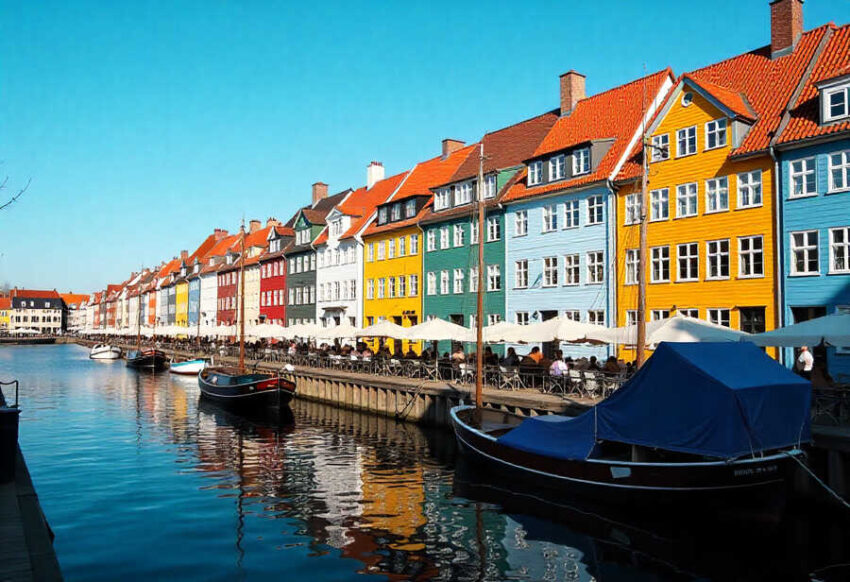Denmark Joins Italy, Costa Rica, France, And Ireland As Switzerland Issues Urgent Travel Advisory For Winter Season Amid Increased Threats And Ongoing Protests In Key Destinations: Here’s All You Need To Know
Switzerland has issued an urgent travel advisory for Denmark, Italy, Costa Rica, France, and Ireland, citing increased threats of terrorism, rising crime rates, and ongoing political protests as the primary reasons for the heightened caution this winter.
Switzerland has issued an urgent travel advisory for Denmark, Italy, Costa Rica, France, and Ireland, citing increased threats of terrorism, rising crime rates, and ongoing political protests as the primary reasons for the heightened caution this winter. With these key destinations experiencing widespread unrest and security concerns, travelers are strongly advised to take extra precautions to avoid disruptions and stay safe during their trips. This advisory outlines the risks in each country and provides vital information to help travelers navigate the challenges of the upcoming winter season.
As winter approaches, Switzerland has issued a new travel advisory, urging all travelers to exercise increased caution when visiting several countries. While Denmark, Italy, Costa Rica, France, and Ireland have always been popular destinations, ongoing political unrest, the threat of terrorism, and rising crime rates have prompted the Swiss government to issue a warning. This article outlines the specific risks and travel advice for each of these countries, offering guidance for those planning to visit during the colder months.
Denmark: Navigating Winter’s Challenges Amid Terror Threats and Crime Risks
Denmark has long been regarded as a relatively safe travel destination, yet Swiss authorities have highlighted specific concerns as the winter season approaches. While general travel to Denmark remains safe, there are several important considerations for travelers.
Demonstrations and Protests
Protests and demonstrations are expected across major cities like Copenhagen, Aarhus, and Odense. While Denmark’s political protests are often peaceful, there have been instances where tensions escalated into violent confrontations. Given that winter can bring an increase in public gatherings and social movements, travelers should be cautious around areas of demonstration, especially as the country deals with issues such as immigration policies and climate change activism. Riots, property damage, and road blockages may occur, and travelers are urged to stay informed through local news sources or consult their hotel staff about any potential disruptions.
Terrorism and Public Safety
Denmark remains on alert for terrorism-related activities. The threat of terrorist attacks is particularly high in crowded public spaces, such as shopping centers, restaurants, public transport hubs, and religious institutions. With Copenhagen’s Tivoli Gardens and the National Museum of Denmark attracting tourists, large crowds are inevitable. Authorities advise travelers to follow local guidelines, keep an eye on official travel advisories, and remain vigilant in high-traffic areas.
Crime Risks
While Denmark is generally safe, pickpocketing and petty theft have become more common in recent years. Popular tourist destinations like Copenhagen Central Station, Nørreport Station, and Tivoli Gardens are hotspots for opportunistic theft. Travelers should avoid carrying large amounts of cash, store valuables in hotel safes, and stay alert in crowded spaces.
In regions like Greenland and the Faroe Islands, where infrastructure is more limited, safety concerns are related to extreme weather conditions. The severe winter weather can pose risks, especially in remote areas where rescue services may not be immediately available. Travelers should be well-prepared with proper gear, including navigation devices and satellite phones.
Italy: A Beautiful Winter Destination With Political Tensions and Terrorist Risks
Italy is an iconic European destination, drawing millions of tourists every winter for its scenic landscapes, rich history, and culture. However, travelers should be aware of potential risks during their stay.
Political Unrest and Strikes
Italy is expected to experience political unrest, as demonstrations and protests are planned in major cities. The country’s political climate is volatile, with ongoing issues related to economic inequality, migration policies, and environmental concerns. Demonstrations can turn violent, particularly in metropolitan areas like Rome, Milan, and Naples. Travelers are advised to avoid protest areas and remain alert to potential clashes between protesters and security forces. Moreover, strikes by transportation unions may cause delays and disruptions to travel services, including rail and air travel, further complicating winter vacations.
Terrorist Threats
Terrorism continues to be a concern in Italy, especially in major tourist hubs such as Venice, Florence, and Milan. Popular sites, including the Colosseum, Vatican City, and major shopping districts, attract large crowds, making them potential targets for terrorist activities. The Italian government has heightened security measures around key landmarks, and tourists are advised to stay informed through local news and follow security advice to avoid risky situations.
Crime
Pickpocketing remains one of the most common crimes in Italy, especially in busy tourist destinations. Areas such as the Spanish Steps, the Vatican, and major railway stations like Roma Termini are known for incidents of petty theft. Thieves often work in groups, distracting victims while others steal wallets or bags. Travelers should be cautious, using anti-theft bags, keeping valuables out of sight, and always being alert to their surroundings.
Driving in Italy can be challenging due to narrow streets, heavy traffic, and local regulations such as the ZTL (Limited Traffic Zones) in cities. Visitors are advised to research the area’s driving rules before traveling.
Costa Rica: High Crime Risks and Social Unrest Pose Challenges for Winter Travelers
Costa Rica offers incredible biodiversity, tropical beaches, and a laid-back atmosphere, making it a popular destination for nature lovers and adventure tourists. However, travelers should take extra precautions in light of the country’s current security concerns.
Drug Gang Violence and Political Unrest
Costa Rica has become increasingly affected by drug cartels, with organized crime groups involved in violent activities. Tourist areas, particularly along the Caribbean coast from Puerto Limón to Puerto Viejo, as well as in popular spots like Jacó and Manuel Antonio, have seen a rise in violent crimes. Armed robberies, sexual assault, and theft targeting tourists are common, with reports of gangs robbing buses and attacking travelers in remote areas.
Social unrest, exacerbated by economic inequality and political tension, has led to demonstrations, strikes, and road blockages. These disruptions can cause significant delays, especially in urban centers such as San José. Travelers are urged to stay informed about local conditions and avoid areas of unrest. The Swiss Embassy in Costa Rica has limited ability to assist with evacuations, so it’s important for travelers to plan ahead and know alternate routes in case of road blockages.
Terrorism Risk
While Costa Rica does not have a history of major terrorist attacks, the possibility cannot be ruled out. As with any international destination, travelers are advised to stay alert in public spaces and avoid participating in any public demonstrations or unrest.
Crime
The crime rate in Costa Rica is notably high, especially in tourist-heavy areas. To minimize risk, travelers should avoid carrying valuable items such as jewelry, cameras, and large amounts of cash. In particular, women traveling alone should be especially cautious, and visitors should avoid walking in poorly lit or unfamiliar areas at night. Renting cars is common for tourists, but it’s essential to ensure the car is parked in secure, well-lit locations.
France: Winter Travel Threatened by Strikes, Terrorism, and Crime
France is a beautiful and culturally rich destination, but winter visitors need to be aware of specific safety concerns during the colder months.
Strikes and Public Unrest
France is notorious for its strikes and protests, and winter is no exception. Demonstrations can cause major disruptions to transportation networks, including train and air travel. The French government has already warned travelers that public transportation, particularly in Paris and other major cities, may be affected by industrial actions. Additionally, protests related to various socio-political issues, including labor rights and climate policies, could turn violent. Tourists should avoid protest zones and closely monitor local news for updates on strike activity.
Terrorist Threats
Like many other European nations, France faces an ongoing threat of terrorism. High-profile public spaces such as shopping districts, markets, cultural festivals, and tourist sites are considered vulnerable. While French authorities have robust counterterrorism measures in place, travelers should remain vigilant in crowded areas. In particular, major tourist destinations such as the Eiffel Tower, Notre-Dame Cathedral, and the Louvre Museum are popular targets for large-scale public gatherings, making them susceptible to attacks.
Crime
Petty theft and street crime are common in tourist-heavy regions such as Paris, Marseille, and the Côte d’Azur. Pickpocketing, car theft, and bag snatching are frequent in busy metro stations, at train terminals, and in high-tourist areas. Travelers should keep their valuables securely stored, especially when in crowded places like cafés, markets, or tourist attractions. It’s also wise to be cautious when using ATMs, as fraudsters often operate in these areas.
Ireland: Peaceful Yet Cautious Winter Travel Amid Potential Terrorism and Crime Risks
Ireland continues to be a safe travel destination, but there are important precautions for tourists, particularly as the country experiences periodic demonstrations and potential security concerns.
Political Demonstrations
While Ireland generally remains peaceful, travelers should be aware that demonstrations and public gatherings can sometimes become volatile. Protests over political issues or public policies are common, particularly in major cities like Dublin. Riots and clashes with security forces are rare but possible, especially if the protests grow large. Travelers are advised to steer clear of these gatherings, as they may escalate quickly and lead to public safety risks.
Terrorism Risks
Though the risk of terrorism is low in Ireland, travelers should still exercise caution, especially in public spaces such as airports, train stations, and crowded tourist attractions. The Irish government continues to monitor and counteract potential threats, and visitors are advised to stay updated on security alerts.
Crime
Petty crime, particularly pickpocketing, is common in Dublin, especially in busy tourist districts such as Temple Bar. To avoid being targeted, tourists should carry minimal cash, use anti-theft bags, and remain alert in crowded areas. At night, it is recommended to stay in well-lit areas and avoid walking alone in unfamiliar neighborhoods.
Switzerland’s updated travel advisory provides crucial insights into the security landscape for winter travelers heading to Denmark, Italy, Costa Rica, France, and Ireland. While these countries remain popular winter destinations, travelers should be aware of the political tensions, heightened terrorism risks, and increasing crime rates that could affect their safety. By staying informed, adhering to local regulations, and exercising caution in public spaces, travelers can ensure a safer and more enjoyable journey.
Switzerland has issued an urgent travel advisory for Denmark, Italy, Costa Rica, France, and Ireland due to heightened risks from terrorism, rising crime rates, and ongoing political protests, which are expected to impact winter travel. Travelers are advised to exercise caution and stay informed about the evolving security situation.
Each of these countries offers unique experiences for winter tourism, but preparation and awareness are key. Travelers are encouraged to follow local authorities’ guidance, monitor news updates, and avoid areas of unrest or high crime activity. Through these precautions, tourists can continue to enjoy the rich cultural, natural, and historical offerings of Denmark, Italy, Costa Rica, France, and Ireland while staying safe throughout their winter travels.
The post Denmark Joins Italy, Costa Rica, France, And Ireland As Switzerland Issues Urgent Travel Advisory For Winter Season Amid Increased Threats And Ongoing Protests In Key Destinations: Here’s All You Need To Know appeared first on Travel and Tour World


